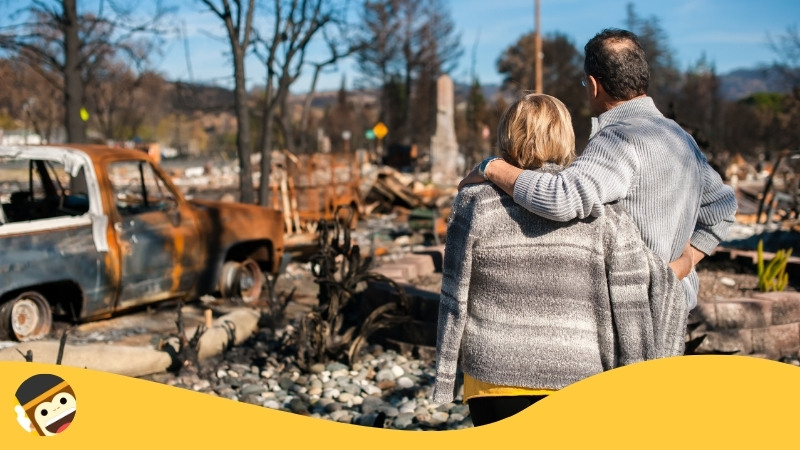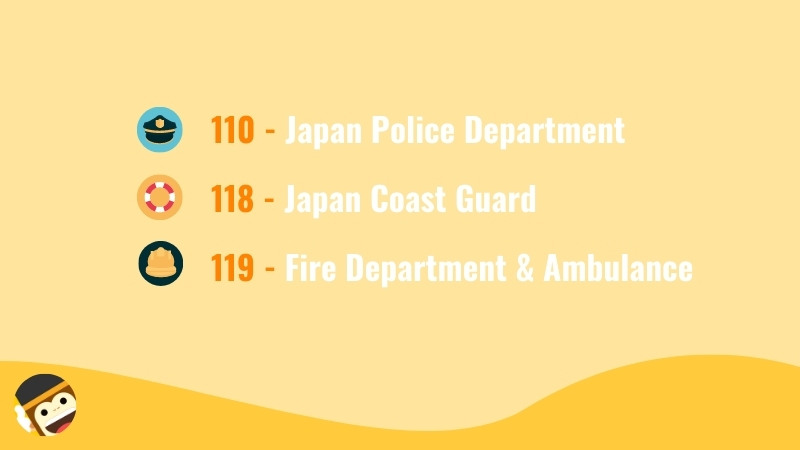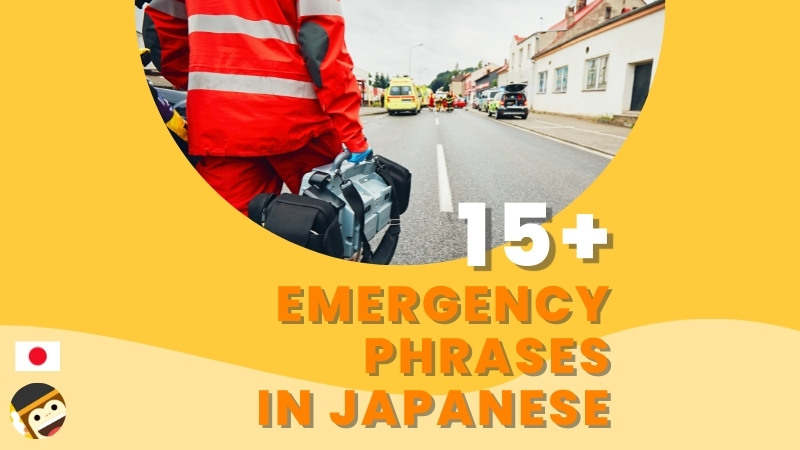Even though Japan is an amazing country to travel to, you can also encounter some unfortunate events, such as accidents, anywhere and anytime. Therefore, it’s good to know emergency phrases in Japanese, just in case.
Traveling to Japan is a dream come true for many of us; experiencing the Japanese culture, taking pretty travel photos, eating delicious Japanese foods, trying on kimonos, and much more.
Yes, these are awesome, but there are also some not-that-awesome things you can encounter while traveling to a foreign country, such as emergency (緊急 – kinkyuu) situations, accidents, robbing, injuries, disasters, etc.
Don’t get me wrong, I’m not a doomsayer, but I’m just saying that these things happen to many tourists worldwide. This guide will help you prepare just in case something unfortunate happens on your next trip to Japan.
Speaking from my experience, learning emergency phrases in Japanese is a good idea as much as learning survival Japanese phrases. So if we’re on the same wavelength on this, it’s time to learn Japanese phrases for emergencies.
Page Contents:
- Why Should You Learn Emergency Phrases In Japanese?
- How To Ask For Help In Japanese?
- In Case Of A Missing Case
- In Case Of An Illness Or Injury
- In Case Of An Accident
- In Case Of A Natural Disaster
- Emergency Contact Numbers In Japan
- Emergency Related Japanese Vocabulary
- Learn Japanese With The Ling App!
Why Should You Learn Emergency Phrases In Japanese?
If you go through a tough situation and don’t know what to do because of the language barrier, your whole trip can be ruined. We don’t want this. We want to know what to do and say in case of a mishap.
At this point, learning emergency phrases in Japanese can make the situation easier for you. Because you’ll know how to ask for help from Japanese people or which number you should dial in case of an emergency.
Let’s start with the most basic phrases to ask for help in Japanese.
How To Ask For Help In Japanese?

There are different ways to ask for help regarding the situation. If it is an emergency and you need help urgently, you can shout “tasukete!” this way, you can alert the people around you to help you as soon as possible.
- 助けて! (Tasukete!) – Help!
- 助けてくださいませんか (Tasukete kudasasimasen ka) – Can you help me?
- ちょっと助けてください (Chotto tasukete kudasai) – Please help me.
If you need help with something regular and there is no emergency situation. You can kindly ask for help from someone by saying, “tasukete kudasasimasen ka” or “chotto tasukete kudasai.”
In Case Of A Missing Case
Missing cases are pretty common in tourist areas, so you should be extra careful. If you lose your personal stuff like a phone, bag, or anything else, you should go to the Lost And Found Office to report your missing belongings.
However, if you think your personal belongings are stolen, or you’ve been robbed, you should head to the nearest police station.
落し物をしました (otoshimono o shimashita)
Meaning: I lost something.
You can explain your situation briefly by saying this simple phrase. The people around you will understand that you lost something, and they can give you directions to the Lost and Found Office in the area.
遺失物管理室 は どこ です か (ishitsumono kanrishitsu wa doko desu ka)
Meaning: Where is the Lost and Found Office?
If you don’t know where the Lost and Found Office is, you can use this phrase to ask for directions. The officers will do their best to find your missing stuff when you get there. You can even talk to an English-speaking officer to express yourself better.
In Case Of An Illness Or Injury
Never underestimate an illness, even if it looks like the basic flu; we all learned lessons from Covid-19, right? You should go to the nearest hospital and see a doctor.
けがをした (kega o shita)
Meaning: I got hurt.
You can use this phrase if a part of your body is hurt. For example, I hit my little toe on the edge of a chair almost daily; it has become a habit for me. 😅
Additionally, you can say 痛い! (itai!) to express the phrase “ouch, it hurts!” in English.
私は病院に行きたいです (watashi wa byōin ni ikanakereba narimasen)
Meaning: I want to go to the hospital.
If you feel terrible and dizzy, you may need someone to take you to the hospital. In this case, you can use this phrase. It conveys the meaning that you’re going through a bad illness and need some medical emergency services.
風邪をひきました (kaze o hikimashita)
Meaning: I caught a cold.
It’s very easy to get the sniffles, especially in the midseason. To be honest, I’ve already caught a cold. So, you can say that you caught a cold with this phrase.
__アレルギーがあります (__ arerugii ga arimasu)
Meaning: I have a __ allergy.
Another critical health condition you should express is allergies. When you go to a cafe or restaurant, make sure to remark your allergy for your own sake. The same thing applies when you go to see a doctor.
In Case Of An Accident

Traffic accidents can happen anytime, anywhere, and they can cause major injuries. In case of a traffic accident, the first thing you should do is call an ambulance.
救急車を呼んでください (kyūkyūsha o yonde kudasai)
Meaning: Call an ambulance!
If you’re the one who is injured, you can tell other people to call an ambulance for you. Even if it looks like you don’t have a severe injury after a car accident, you shouldn’t move your body until medics come and do a check-up to ensure you don’t have an internal injury.
事故がありました (jiko ga arimashita)
Meaning: There has been an accident.
You can use this phrase if you witnessed a traffic accident and had to call the emergency call center. They need to know the situation, and you can explain it by saying there has been an accident.
緊急事態です (kinkyū jitai desu)
Meaning: It’s an emergency!
Similar to the situation above, you can use this sentence to state the importance of the situation when you call the emergency call center. It can be the police or fire department.
In Case Of A Natural Disaster

Natural disasters such as earthquakes and tsunamis are common in Japan. You should be careful as a traveler and be aware of any possible dangerous situation. In a disaster, you must find an evacuation area or a shelter nearby.
避難場所はどこですか (hinanbasho wa doko desu ka)
Meaning: Where is the evacuation area?
Usually, right after a devastating disaster, people go to a specific area called the evacuation area. And wait there until the danger is over. So the first thing you should ask is, “where is the evacuation area?”
電車はすぐに動きますか (densha wa sugu ugokimasu ka)
Meaning: Will the trains start running again right away?
Another essential thing to know after a natural disaster is whether public transportation is still running or not. When it comes to Japan, trains are the most commonly used vehicles.
Emergency Contact Numbers In Japan

If you need to make an emergency call, make sure to dial one of these emergency services numbers.
- 110 – Emergency call to the police
- 118 – Emergency call to the Japan coast guard
- 119 – Fire department, ambulance, emergency rescue
When you call 119 in Japan, the officer will probably ask you “火事ですか (kaji desu ka),” meaning “is it a fire?” they ask you since 119 is the standard contact number for the fire department, ambulance, and emergency rescue.
Emergency Related Japanese Vocabulary
Learn Japanese With The Ling App!
If you want to learn the Japanese language or any other 60+ languages offered in the app, then you should try the Ling App!

Ling is a language learning app designed to help all language learners. It offers many engaging activities ranging from writing and listening exercises, mini-games, and quick quizzes, to an AI chatbot to practice speaking with. The Ling App is the best all-in-one language learning resource for you.
Also, don’t forget to visit our Japanese blog weekly to learn more about the Japanese language and culture!
The Ling App has everything you need to master core language skills. You can try it out for FREE today by downloading it from the App Store or Play Store.
Start learning Japanese or another new language by downloading the Ling App today!
Until next time, じゃあまたね!



































































